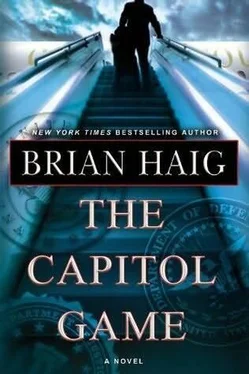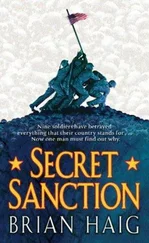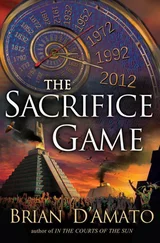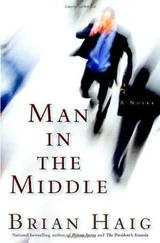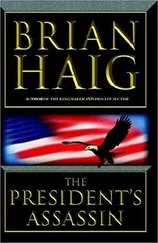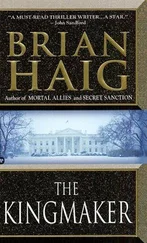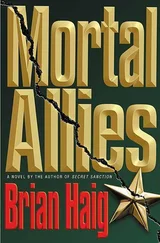“You’re doing the right thing,” Mia said, making an obvious effort to sound reassuring. “I’ll tell you everything when the time’s right.”
It took only six hours for the summary Mia put in Nicky’s hands to work its way up the chain to the very top. Three hours to be read, confirmed, and painfully contemplated by the director of the DCIS. An hour and a half to be viewed with undisguised horror by the undersecretary for procurement. Then another hour and a half for the director of test and evaluation to dream up a few lame excuses, none even remotely credible, before the procession of deeply addled senior officials marched into the office of the secretary of defense with the alarming news.
The president of Summit Testing fielded calls from every level. At one point, he even gathered the evaluation team that had spent six long months in Iraq. On the speakerphone, they defended their scientific judgment and recited their impressive résumés-two PhDs in molecular chemistry from MIT, three master’s degrees from a series of other distinguished academic institutions-and recounted how they arrived at the incontrovertible conclusion that the polymer was a star that quickly fizzled into a flop.
They explained that the study and pictures CG had bandied around town to such terrific effect in fact represented only their preliminary results. For three months and twenty-nine days the polymer had worked like magic. In jubilation they had prepared their report and labeled it as the final; the polymer was the thing dreams are made of, with an album of astonishing pictures to prove it.
Only a few days after the “final” report was finished, and only two days before the crew was scheduled to climb on a freedom bird and fly home, did the word “final” turn into “disastrously premature.” The first bad news hit. Two coated vehicles were destroyed by roadside bombs.
The wrecks were hauled back to the compound and rigorously inspected. The remarkable defensive qualities were entirely and mysteriously gone. History. The polymer was now nothing but a ridiculously expensive paint job. Over the ensuing weeks, as more of the polymer-coated test vehicles became casualties, the examinations continued. More wrecks hauled into their yard, more head-scratching, more disappointment as the team realized all those months were a waste. You see, they said, not all the vehicles deteriorated at the same pace, or even the same way.
There were variations. Some coated vehicles degraded quickly; a few lingered months longer. Some vehicles exhibited a patchwork, a quilt of polymer with all its amazing qualities intact, intermixed with large dead spaces. Others seemed to turn off uniformly as if flipped by a big switch. Why remained a mystery. The answer was complicated and elusive. There were too many variables, too many unanswerable questions: how long a vehicle remained under cover from the sun; how thick the coatings were; how the intensity of the sun fluctuated with the seasons.
All these things could be factors, or maybe none of them at all. It was impossible to say.
The team remained in Iraq another two months, until the last of the coated fleet was completely defenseless. There were no visible signs of degradation, they said; the polymer gave up no clues as to its virility. Worse, there was no safe way to test for the degradation of the polymer they were aware of.
Aside from flinging an explosive against the vehicle and watching it either burst into a fireball or shrug it off, you couldn’t tell whether the polymer was effective or not. A vehicle could survive the worst you throw at it one minute, and be a death trap ten seconds later.
That troubling unpredictability meant the polymer was dead on arrival.
The old, now disproved “final” report was stuffed in a drawer, never meant to see the light of day. Few copies had been produced. Distribution was strictly controlled. Aside from Summit’s own file copies, only Perry Arvan had received, or even laid eyes on, the fool’s gold, to the best of their knowledge.
And no, nobody from the Capitol Group had ever called Summit to discuss or confirm the results.
All attempts to locate Perry Arvan proved disappointing. His telephone service was disconnected. Ditto for his water and electricity and heating oil. His home was vacant and had been for a long time. According to New Jersey’s DMV, his cars had been sold off months before. There had been no use of his charge cards or his local bank for nearly five months.
Eventually his oldest son was located, in Pennington, New Jersey, where he lived with his wife and three children. Yep, Dad’s been gone for months, he confirmed-right after the company was sold, he and Mom flew south, leased a nice yacht with a small crew, and vowed not to set foot back on American soil until they walked every lovely beach on every neglected island in the Caribbean Sea. Last time they called, they were in Saint Martin, inching their way south toward Trinidad and Tobago. Dad was fine, Mom slightly sunburned but having a blast; his father hinted that this was likely his last call for a long while.
Oh, yes, he could definitely see how his father’s long jaunt seemed a little peculiar, Perry’s son offered, very agreeably. Then again, Dad had the company he spent forty-five years building stolen under his feet by some big greedy corporation in D.C. If he wanted to vanish for a while, to put it all behind him, who could blame him? Plus, after forty-five years of unrelenting work and crushing responsibilities, why not steal away for a prolonged, sun-soaked hiatus where the most pressing issue was which rum to try next?
Do you happen to know the name of the boat? the head of DCIS asked with a grave edge. Nope, they never mentioned it. Where did they rent the boat from? You know what, they never mentioned that either.
As they spoke, the son silently congratulated his father on whatever it was he had pulled off. Three Pentagon bigwigs were on the phone line, peppering him with questions. Perry’s son wasn’t naïve. Their voices crackled with apprehension and accusation.
A scam of some sort, and whatever it was, it had to be huge.
Run, Dad, run, he thought to himself.
The call came at the worst possible moment. After two prolonged days of nearly constant drinking and occasional golf under the baking Bermudan sun, Mitch Walters’s back was killing him. He had valiantly teed off that morning, but after the fourth hole he gave up and limped off the course, kneading his lumbar, heading straight to the hotel’s massage parlor. A large black masseuse with fingers like power drills was just working his way down the lower vertebrae. Two other CEO types were getting the kinks worked out on nearby tables. To his right was Paul Merrill, the thirty-two-year-old, hyper-brilliant founder of a software firm, now on the Forbes list as one of America’s ten richest men. On his left, Carl Jorgenson, a hedge fund guru, also worth billions, just not as many as Merrill, was groaning quietly.
Briefly wondering who might be calling, he positioned the phone to his left ear and grunted, “Mitch Walters” into the receiver.
“This is Thomas Windal.” Very abrupt-no hello, no warm greetings.
It took a moment before Walters registered that this was the Pentagon’s undersecretary of procurement. “Uh, hi, Tom. How’s everything up there?”
“Bad. Awful, Mr. Walters. This call represents your official notification.”
Mr. Walters, not Mitch, he noted.
Walters slapped away the hand of the masseuse and sat up. “About what?”
“As of this moment, the polymer contract is suspended. We now enter a thirty-day period. That’s how much time you have to show that the polymer is effective or the suspension becomes permanent.”
Читать дальше
